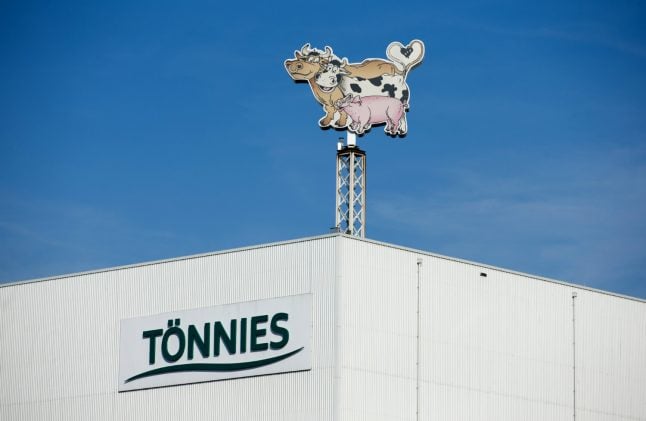Around 7,000 people are in quarantine in the Gütersloh district, near Bielefeld in North Rhine-Westphalia, following the major outbreak at the Rheda-Wiedenbrück slaughterhouse run by Tönnies, Germany's leading meat processing company.
Since the beginning of the week up until Wednesday June 17th, more than 655 employees have tested positive for Covid-19.
Just over 1,000 employees are being tested. Most results were available by Wednesday evening but some are still pending.
As The Local reported, Gütersloh district decided to close all schools and daycare centers (Kitas) until the summer holidays in a bid to try and slow the spread of Covid-19 in the area.
According to bosses at Tönnies and Sven-Georg Adenauer, Gütersloh district administrator, the virus may have spread when employees from Eastern European countries returned from visiting their families after European border controls were relaxed in recent weeks.
All 6,800 workers at the Tönnies facility had been tested four weeks ago as a precaution and only eight were positive, Adenauer said.
The map below shows where the processing plant is situated in western Germany.
READ ALSO:
- New coronavirus update at meat processing plant sparks concern across Germany
- Two German states to test all meatpacking workers after coronavirus outbreaks
Tönnies also flagged up that the conditions, particularly the cool temperatures, in the processing plant could have contributed to the spread of coronavirus.
However, it is still too early to draw conclusions, authorities said.
Politicians, including in Die Linke (The Left) say working conditions in the meat industry are a factor.
“We can only apologise,” said Tönnies spokesman Andre Vielstädte. He said the firm had worked “intensively” to “keep the virus out of the company”.
There have been hundreds of major recurring outbreaks across the world at slaugherhouses which experts say could have long-term implications for food supply systems.
The reasons for the outbreaks are thought to be a number of factors such as: crowded working conditions, workforces that are often made up predominantly of migrant workers living in communal housing, and the fact that plants have remained open during the whole coronavirus crisis.
'No need to stockpile'
At a press conference on Wednesday, Gütersloh district administrator Adenauer announced that he had ordered the closure of the slaughterhouse – likely for 14 days initially.
He said if infection numbers go down, the facility could reopen earlier.
It's unclear how the closure will affect the nationwide supply of some meats, but Adenauer urged people not to panic-buy.
The Tönnies Group said it plans to increase production at other locations in order to compensate for the shortfalls at its main location.
Reform of meat industry
Meanwhile, Germany has vowed to crack down on working and accommodation conditions at meat processing plants after a number of outbreaks in the country during the coronavirus crisis.
A draft law agreed last month by the government will force slaughterhouses to quit the practise of hiring eastern Europeans on short term contracts and will impose heavy fines on companies that fail to comply.
Trade unions say that the eastern Europeans are the victims of appalling living conditions at the mass accommodation provided for them by sub-contractors hired by the meat packing industry. Furthermore they lament a practise of meat companies contracting out work to subcontractors so that they cannot be held liable when abuses are exposed.
READ ALSO: Germany to reform meat industry after corona outbreak exposes abuses
What's the coronavirus situation in Germany?
Within 24 hours, the public health authorities in Germany reported 580 new coronavirus infections to the Robert Koch Institute (RKI). This means that since the beginning of the corona crisis, 187,764 people in Germany are confirmed to have contracted Sars-CoV-2, the RKI reported on Thursday morning.
A total of 8,856 have died in Germany, while about 174,100 people have recovered from the disease.
According to RKI estimates, the reproduction number, R-value for short, dropped below the critical mark from 1.0 to 0.86.
This means that an infected person infects less than one other person on average. The R-value reflects the course of infection about one and a half weeks before. The day before it had been 1.0.
Experts have hammered home the importance of keeping this critical number under 1.



 Please whitelist us to continue reading.
Please whitelist us to continue reading.
Maybe time to stop eating meat?